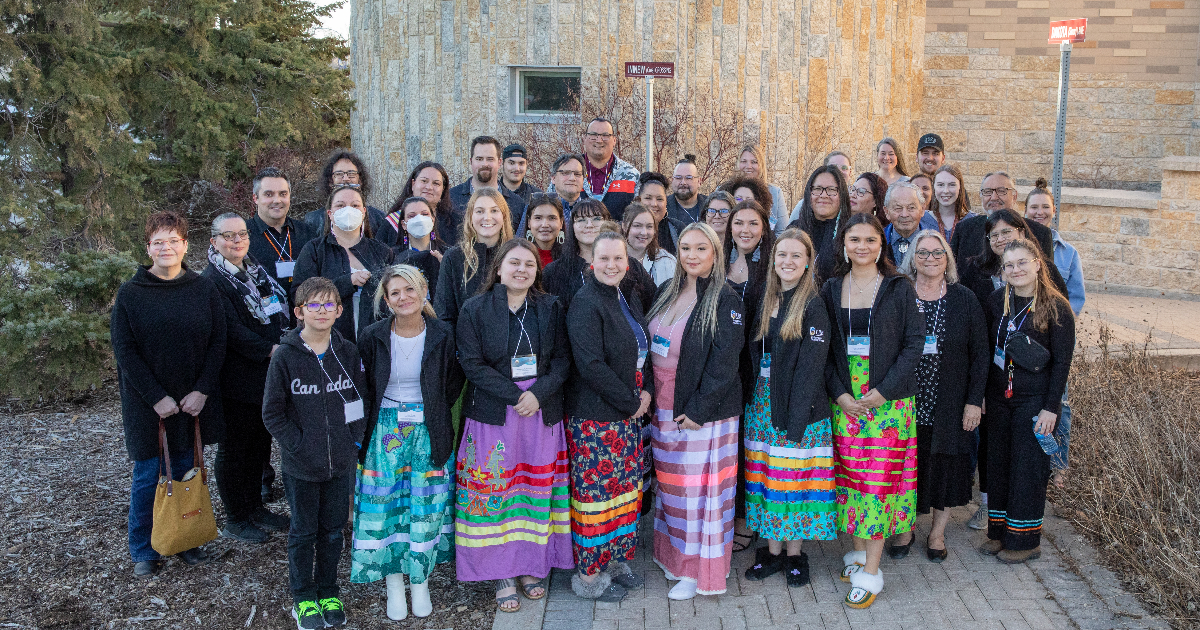
Participants in the 2022-2023 ICE program surrounded by Elders, ICE alum, community leaders and loved ones on May 1, 2023.
Centering Indigenous values, supporting leadership, building community
Indigenous Circle of Empowerment (ICE): Applications welcome until Sept. 16
The Indigenous Circle of Empowerment (ICE) is a student leadership development program rooted in culture and focused on personal, educational and professional development; as well as community engagement. It provides a diverse range of activities, including conversations with esteemed Indigenous leaders, professional development, learning from Elders and Knowledge Keepers, and collaborative team capstone projects.
After experiencing remote learning during the pandemic, Bachelor of Health Studies student Lauren Hallett was eager to become part of the campus community.
“Graduating high school during the height of the COVID-19 pandemic and beginning university remotely, I didn’t even get the chance to walk the campus until my second year,” says Hallett. “I felt totally separate from the U of M student life and wanted to integrate myself. Doing so can be scary, which is why I am so grateful to my ICE family for being such welcoming, warm and encouraging people.”
Madison Morrow, a fourth-year nursing student, also joined ICE seeking self-improvement and connection.
“One of the main reasons I joined the Indigenous Circle of Empowerment was to improve my leadership skills. I also wanted to make more connections within the Indigenous student community,” says Morrow.
Students say one of the most impactful aspects of ICE is the opportunity to engage with Elders and Indigenous leaders. Antonina Kandiurin, a recent UM graduate with a Bachelor of Kinesiology – Athletic Therapy says she loved being able to hear from inspiring Indigenous peoples.
“I looked forward to meetings knowing we would be meeting with and listening to talks from outstanding Indigenous leaders whom I have now learned so much from,” says Kandiurin.
For Morrow, the Speech Craft public speaking session facilitated by the Anishinabe Toastmasters had a big impact.
“Our Speech Craft sessions helped me gain confidence in my ability to speak publicly, something valuable I will use in my future,” says Morrow. “Speaking in front of a crowd can be very intimidating. Although it was hard at first, ICE members cheered each other on as we embarked on our Speech Craft journey.”
During the 2022-2023 academic year, ICE students initiated a new event called “a day in the life of an Indigenous student at UM.” This event aimed to share their post-secondary experience with grade 12 students by offering mentorship and an authentic day on campus. Students were able to attend a real live university-level lecture, listen to a panel discussion on imposter syndrome, visit places on campus that UM students use regularly and share their experiences in a sharing circle led by Elder Carl Stone.
Hallett says it was a collaborative process, from everyone contributing to the creation of the group project to brainstorming ideas and eventually hosting Indigenous high school students on campus.
“It was definitely a defining moment for me, being able to connect with young Indigenous people who are passionate about their culture, as well as learning,” says Hallett. “It helped me gain confidence in my leadership abilities and it was grounding to witness and learn from the incredible high school students.”
Through collaborative projects like “a day in the life of an Indigenous student at UM,” participants form deep connections and gain new perspectives on leadership. The event’s success has encouraged an expansion to include more Indigenous high school students on more days in 2024.
ICE aims to equip its students with valuable leadership skills they can apply beyond the program.
Kandiurin, now working as a Women’s Group Leader at the Churchill Health Centre, says ICE has had a major impact on her life.
“A teaching about leadership I have carried with me from ICE is the importance of working together,” says Kandiurin. “A good leader looks to learn from and uplift others from their community.”
Hallett says it is because of ICE that she has begun to see herself as a leader.
“Before, I felt like I was imitating other leaders I admired,” she says. “Now, I am confident in both my knowledge and experience that have allowed me to maintain leadership positions. One of which is being a volleyball coach to young people in my community. One of the greatest lessons I learned through hearing the stories of so many inspiring Indigenous leaders is to have humility. Leading is about the team. It’s important to me as a coach that my team feels safe and supported by me as they focus on their skill building.”
And Morrow says she has also applied skills gained from ICE to her practice as a nurse.
“In nursing, good communication, collaboration, and leadership skills are important. Through my time in ICE, I was able to improve on all three.”
Beyond practical skills, ICE serves as a supportive community throughout students’ studies.
“It was a safe space for me,” says Kandiurin. “I knew that no matter what I was personally going through, that on those Monday evenings, I would have a community of amazing people to go to. It was a few hours of my week where I could disconnect from my life as a student and be surrounded and uplifted by other Indigenous students and staff.”
“Belonging to a group of strong, wise, Indigenous women helped me to overcome my own personal imposter syndrome by making me see that I have a voice that matters and ideas that deserve to be heard,” says Hallett.
Kandiurin concludes, “I feel as though I am a whole new person coming out of the ICE program and have a new perspective when it comes to leadership.”
Indigenous students who embody leadership, self-development and community engagement are encouraged to apply for the 2023-2024 program. To learn more and find details on how to apply, visit the ICE website.
















